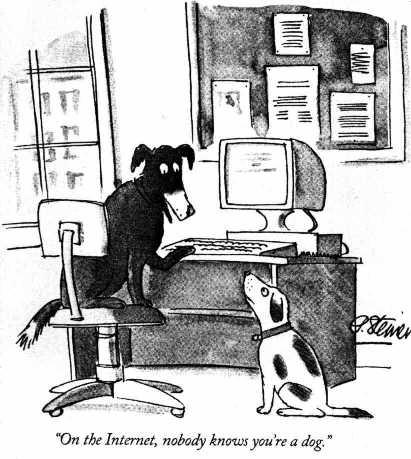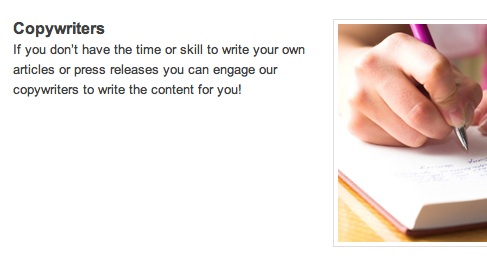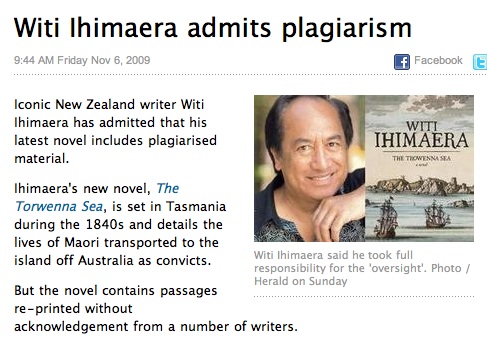
"On the internet, nobody knows you're a dog" Peter Steiner, The New Yorker July 1993
There’s a ‘phoniness’ that plagues the internet. (Peter Steiner’s famous 1993 cartoon “On the internet nobody knows you’re a dog” has become axiomatic).
Wikipedia suffers a scandal when it’s exposed that some phoney posing as a ‘learned academic’ has been pasting content into the wiki — which, I guess, compared to the fake surgeons that pop up now and then in our health system, ain’t no big deal.
This inauthenticity applies in spades to social media (ghost-written celebrity tweets etc) in particular.
Plagiarism or unattributed use of others’ written or other material has always been rife. As university professor/novelist Witi Ihimaera has recently found, the age of Google book-scan has made it child’s play to find phraseology and passages that have been consciously or unconsciously lifted from another person’s writing.
While I’m no saint, I do try to/aim to acknowledge the source of material I use from others. ‘Always acknowledge the source of power’ was a thought drummed into me at some business/personal development courses I attended years ago. It was a lesson in ethics and integrity. If someone else has expressed ‘it’ so well that I want to pass that ‘map’ on to my readers, my view is that it does me no harm whatsoever to cite the source. It is lazy not to.
Part of this might be my journalism training, which leans so heavily on attributed sources. (I’ve actually come to see that’s one of the downsides of the profession — it encourages a sense of being a ‘neutral’ observer and uninvolved note-taker and not a committed change-agent or actor … a sense which can need shaking off. But that’s a topic for another time.)
But there’s another angle to this idea of the unattributed use of others’ words which intrigues me because I haven’t thought about it this way before — and that’s the use of ghostwriters to build ‘credibility’ or, in the age of twitter and blogs, to build up a ‘personal’ following.
As we noted at the time, there have been reports that many of the tweets written by celebrities aren’t actually, ahem, written by the celebrities. Er, OK. That’s fine — they’re often described as plastic people and living a plastic life for their ‘public’ which doesn’t relate to their private life. We also talked earlier about Madonna/Stephen Fry ‘trading’ their privacy as part of their deal with what some call the bitch-godess Fame.
I guess someone who is famous for their authentic talent had a certain right to use speechwriters to deal with the tedium of feeding the consequent clamouring hunger of their fans for ‘a piece of me.’
But what about using inauthenticity like that on the way UP the ‘fame pole’?
And what about people in business using ghostwriters and copywriters to ‘build trust’ like this:
Some friends of mine are running a new social media (blog/twitter/linkedin…) marketing service for ‘business folk’. Good luck to them, I say. Checking it out, I read these two statements (made without irony) on the same page.
Businesses also need to gain trust with buyers and continue to deliver value. You can achieve both here by publishing news worthy articles focusing on your skills, products, services and knowledge. Your press releases can also be published on [snip] increasing the awareness of your brand and message.
My comment: the key word here is ‘trust‘.
Leave aside how tame “news worthy articles focusing on your skills, products, services and knowledge” might get after awhile, isn’t this just PR flackery? Posing as a ‘blog’?
followed by:

Hmmm
Copywriters
If you don’t have the time or skill to write your own articles or press releases you can engage our copywriters to write the content for you!
Oooh, er.
So the model is: a copywriter will write the content of your ‘blog’ (in amongst the press releases) and you will publish it in your name? Tell me again how that builds trust?
Just a thought.
Of course there are plenty of marketplaces for ‘content’ that an aspiring blogger or tweeter can go to to ‘fill’ their communications channels. I see tweets of wise words, ‘quotes’ and ‘tips’ flying around which seem to be automatically fed out at pre-determined intervals like chicken pellets.
Thus these phoneys are using their API to imitate a ‘friend’ passing on a nugget of wisdom, or something cool that they’ve stumbled across. These automated actions take the thought out of this communication — and, remember, with so much in friendship, “It’s the thought that counts”.
They’re shallow, venal fakes building up an equally fake following.
Then there’s the issue of exposure — like this … (what does this do for trust?):

(image: nzherald.co.nz)
Not a good look.
Here’s quiet word to someone thinking of using a ‘Copywriter’ to save you finding the time or skill to write your ‘trust-building’ blog: Consider whether it may ever at some point, um, emerge that your ‘blog’ has been ghostwritten?
And then, when that happens, what will that exposure do for the ‘trust’?
What will that feel like?
Exactly.
An important point of clarification: In my opinion, a ghostwriter or copywriter is not the same as an editor, someone who helps a writer (professionally or not) express their own words and ideas in a better fashion. Big distinction.
– P
PS: I’ve had the spooky experience of being plagiarised a few times, one exceptionally bold, belligerent and comprehensive case leading me and my fellow authors to sue for copyright infringement in the High Court. (Details here if you care.) Even in that case, I can honestly say, proper source attribution initially, and, failing that, an apology like Witi’s on discovery and an offer to rectify the situation would have gone a long way to settling that dispute quickly.


I think there is a rather thick line that is crossed by an author when he drives his own characters and plot-line into the world of another author’s story. Recently I was accused or doing “a cut and paste job” on a recent story. At the time I shrugged it off as laughable but then on closer examination I realized that my accuser was simply so poorly read that he did not realize that I was paying homage to a far greater author – an author I admired. My accuser did not realize that I was well aware of what I was doing! And while I had no intention of stealing the greater authors’ stories I could not help but realize that this greater author had undeniably influenced, not only my imagination, but my plot-twists and turns as well. I was emulating him – nothing more. But isn’t that the way of writers. A writer is also a great reader and therefore is predisposed to be influenced by the work of another!
Consider this introduction to a book by one of the twentieth century’s greatest literary geniuses.
“…NOTE: Certain slighting references to earlier stories of this type which will be found in the following pages have been put there for purely dramatic purposes. The author would be sorry if any reader supposed he was too stupid to have enjoyed Mr. H. G. Well’s fantasies or too ungrateful to acknowledge his debt to them.
C.S.L…”
The book is “Out of the Silent Planet” — the author — Mr. C.S. Lewis.
Does Mr. Lewis say all that needs to be said? I think he does. The real argument here is that plagiarism, which is essential nothing more than theft vs. artistic license, which allows for variations on theme, plot and characterization, which without there would only be one book on each genre i.e. one detective novel, one love story, one science fiction novel, one horror novel, etc. etc.
A rather bleak and dull outlook for “artistic license” if enforced to this extreme, wouldn’t you say? This is not to say that theft must be discouraged – it must always be – and can never be acceptable in any format and I do think that the majority of writers, editors and publishers are aware of this, or at least say they are.
Thanks for sharing your thoughts Chowbok.
I agree it would be a pretty bleak intellectual and literary landscape if we couldn’t feel free to be inspired by another writer’s work — whether as admiring homage, as you suggest, or feeling our own way along a path set by a master, or the more common form when discussing non-fiction: criticism and argument.
I have learned much from — and been inspired by — the work of other writers in all genres, not just genres in which I write.
The form of many examples of knowledge advancement: thesis-> antithesis -> synthesis (new thesis) requires an awareness of previous contributions, even paradigms so we can think “outside the box”. Nothing wrong with that.
The creatively bankrupt who copy others, or, worse in a way, seek to hitch themselves to an existing bandwagon (e.g. the sudden surplus of shallow angsty teen vampire stories which flow from the success of Stephanie Meyer’s Twilight series) demonstrate that those chasing ‘success’ or (more properly said) seeking to ‘cash in’ on the success of others will, like the poor, always be with us.
Don’t misunderstand me: I love commercial enterprise but there is much more to writing and publishing than just “filling a gap in the market”.
In the plagiarism/copyright infringement case we pursued, the IP thieves had stolen material that I had developed with my co-authors exactly because there wasn’t an existing or current NZ book on the topic. That “gap” was our inspiration.
The laziness and dishonesty the thieves demonstrated by their copying and unattributed inclusion — on exposure — worked exactly counter to the ‘credibility’ they had sought.
As a ‘creative’ writer you always take a risk when your work imitates or otherwise resembles another voice. The experience you cited — being accused of cut-and-paste can’t have felt good.
The owners of Ian Fleming’s estate allowed Sebastian Faulks to write a ‘new’ James Bond novel Devil May Care ‘writing as Ian Fleming’. This was probably the ultimate in acknowledging a source of inspiration overtly up front (er, like, on the cover, man), but maybe you could find a way to let readers know you know what you’re doing.
The creator of the Harry Potter books, JK Rowling has copped some criticism for allegedly copying/dumbing down JRR Tolkien and other “wizard” stories — I don’t know much about that but I have read a wonderful series of books by Stephen Donaldson, The Thomas Covenant Chronicles which would not have existed, I suggest, without Tolkien — but although clearly inspired by JRR, Donaldson does nothing like plagiarism. His brilliant tales and original characters set in a Tolkien-esque fantasy-magical world, “The Land”, move the genre forward and make us readers all richer for it in my opinion.
If your work does the same, Chowbok, then I wish you well. More strength to you. We all stand on the shoulders of giants. – P
There’s an interesting and worthwhile read here from Jolisa Gracewood, the reviewer who, as she put it, ‘just happened to happen on [Witi Ihimaera’s plagiarism] first”.
She makes the point that she didn’t start by googling phrases from the book, but with the topic…
The same “clang of irony” undid the plagiarists who misappropriated my work. As Greenwood says, “to use unattributed material on an obscure subject from one of the only books on the subject is to seriously booby-trap your work”. Ahem. Yes.
In that case it didn’t take long to show that 30% of their, um, publication had been stolen from my book … and then find the unattributed sources of other significant slabs of their um, work.
PS This is a nightmare for Witi, and he has my sympathy.
Hi Peter
Plagiarism is rampant (as you know) and is not likely to diminish as more people make their way into cyberspace and in an effort to portray themselves as the expert in a field, start to utilise other peoples work.
You mention twitter in your work and if you really want to see Plagiarism at work daily sit and watch your twitter stream.
Twitter introduced a concept called the re-tweet which is where you see a tweet you like, your copy it and tweet it yourself but you acknowledge the original tweeter by placing RT and the tweeters name at the beginning of the tweet.
Pretty simple really however even with something as easy at placing RT@tpr2 in front of something they are copying of mine it does not take long before people are just using the tweet and not ackowldeging the source. You see it looks way cooler if you are the orignator of a tweet.
Anthony Robbins said a long time ago that often the things you want to say or express have already been said by someone else so why try and re-invent the wheel, just use their words and acknowldege them for making up the saying, phrase, passage or paragraph.
The saying he used as his example is “The truth is incontrovertible, malice may attack it, ignorance may deride it, but in the end; there it is.”
Winston Churchill
It’s pretty hard to beat that as a saying regarding truth so why not use it and acknowledge Winston for being the first to say it.
With google doing such a fine job of storing nearly every scrappet of information written on the web it’s pretty easy for people to find out who created the work first…. The truth will be found….
Like you Peter I find it a little disturbing that so many people portray themselves as the real deal whilst all they really are is Milli Vanilli without dreadlocks.
Cheers Terry.
Your “Milli Vanilli without the dreadlocks” is such a GREAT description!
I snorted. (Lucky I wasn’t drinking a coffee at the time.)
Yup, I agree, lack of proper attribution/acknowledgement, when marginally deliberate, is mostly either lazy or deceitful, or, in Witi Ihimaera’s case, paying sloppy or mis-remembered homage. He’s paying the price now.
I’m with Tony Robbins, on that score. (He attended the same business courses I was referring to) — if you can, always acknowledge sources. In fact one of my editors (editing ME, I mean) commented that I used so many quotes in one section of a book that it appeared I was like a drunk using lamp posts — more for support than illumination.
I love quotes but Roger was encouraging me to come up with my own ‘fresh’ ways of saying things. Give the reader what they paid for – new views, new models, new expressions of even perhaps familiar ideas. It’s a balance, isn’t it?
But pinching someone else’s material, and claiming it as your own, unattributed is not OK. – P
I would think it would be more difficult to copy someone else’s work and then incorporate that work into your own.
It’s problematic because the thief must actually work harder than the original writer to get the flow of the narrative.
Just my opinion but it’s much easier, if you want to use someone else’s words, is to simply quote them as quotes (and providing the source) and wrapping your own words around them, like this:
Winston Churchill once said “…truth is incontrovertible…” and yet the fact remains that scoundrels and liars abound in the publishing industry all the same. Witi Ihimaera’s gaffe was no gaffe at all. It is this writer’s opinion that he (Ihimaera) assumed, as a Maori, that he and he alone owned the subject matter; and that any authorized biography of these disenfranchised Maoris’ belonged to him and no other. And he may just be right because in the eyes of public opinion Witi Ihimaera can do no wrong — “Witi Ihimaera loved someone else’s words so much he used them in his new novel….” So said the NZ Listener this week, “…[and] in the end; there it is…” the truth is indeed incontrovertible and indisputable – Ihimaera has a righteousness that is denied the rest of us!
Hi Chowbok. Interesting, thanks.
re Witi Ihimaera: “OK, is there anything else in this novel that might have been Insufficiently digested?” was the phrase Jolisa Greenwood used, (quoted in the Listener article) and I agree.
Insufficiently digested is good phraseology for this. As a writer, he blew it, pure and simple — as any of us as writers relying on other people’s material can blow it.
I don’t see any claim of righteousness denied to me, nor any claim (what you refer to as ‘assumed’) of special entitlement to the subject matter based on his Maori ethnicity — the book, as he says in the Listener article, “…goes from Scotland to Wolverhampton to Rhodesia to New Zealand to Tasmania.”
Reading the article, and Ms Greenwood’s blog (which indicates more examples of under-attributed material were detected after the Listener went to press) I see none of the silly guilt-ridden ‘liberalism’ some engaged in during the Maori renaissance of the 1980s — what I called at the time the myth that “oppressed people can do no wrong”.
Witi must be mortified (and rightly so). Plastering his face on the front of the Listener and excoriating him over six inside pages is hardly sweeping it under the carpet.
His novel (and his reputation) is forever tainted.
UPDATE viz today’s NZ Herald story: Exposed plagiarist Witi Ihimaera given $50,000 award
Pretty tough epithet.

Which kind of neatly makes my original point (in my post above) about the potential downside of a business person availing themselves of a ghostwriter to write ‘content’ for their ‘trust-building’ blog. – P
Somehow my integrity forbids me from following in his footsteps…
Does Witi Ihimaera really have a righteousness that is denied the rest of us? $50,000 can’t be wrong, can it? But hey, not bad work for a plagiarist, don’t you think?
The worst of it is that this award sends the wrong message to the student community, his fans, and in general, admirers of good writing and storytelling!
Latest (Wednesday Nov 18, 2009) developments…
Ihimaera to buy back copies of controversial book
Full story: http://www.nzherald.co.nz/nz/news/article.cfm?c_id=1&objectid=10610118
Damage control. Fair enough. It won’t stop this episode being remembered… – P